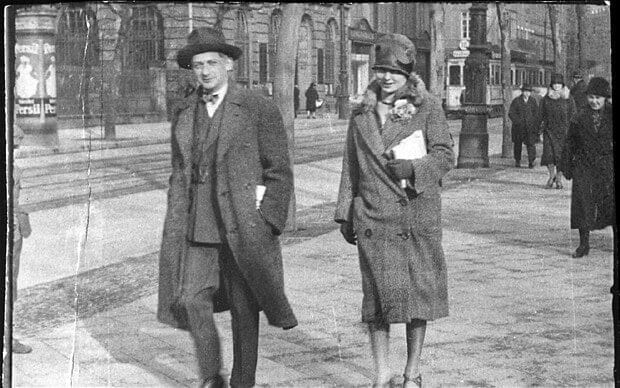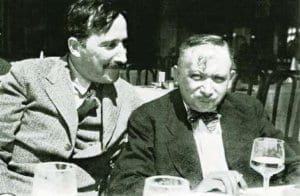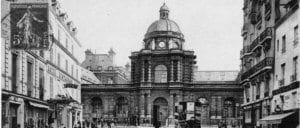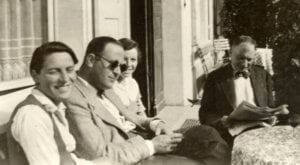Frank Wollheim
Sweden
 |
| Joseph and Friedl in Berlin, 1927. From Wilhelm von Sternberg. Joseph Roth, Kiepenheuer & Wirtsch, 2009. |
Joseph Roth was born on 2 September 1894 in Brody, then a Galician town in the Austrian-Hungarian Monarchy, bordering Russia. His parents married in 1892 and like two thirds of the 20,000 inhabitants were Hassidic Jews. His mother Maria came from a family of merchants. His father worked for a timber trading company and after the embezzlement of goods in Katowice in Silesia during Maria’s pregnancy, he had to flee to Hamburg. During this trip he became psychotic and never recovered nor returned to his wife. The mother was totally devoted to giving Joseph a good start in life and could be seen accompanying him to school holding hands through the years. Joseph was an ardent pupil and graduated with top grades from the stern German gymnasium in Brody in 1913.
The following spring he took up philosophy and German literature in Vienna. He soon became the favorite of the professor Walter Brecht but had a competitor in the professor’s assistant Heinz Kindermann, a future Nazi professor in Danzig. Roth portrayed him as the unkind main character in his first published short story (Der Vorzugsschüler, 1916).
Fights between Polish and Ukrainian students, antisemitism, and animosity between different Jewish groups were prevalent. Roth ignored these, but he indulged in Vienna’s cultural offerings, nobly dressed and using a monocle. He was a pacifist and did not share the general patriotic enthusiasm at the outbreak of World War I, but nevertheless he and a Polish pacifist friend Josef Wittlin volunteered for the army in 1916. Stationed in Galicia Roth witnessed the horrors of war, serving in the press branch but close to the moving front. He published newspaper articles and wrote mostly unpublished poems, much admired by Wittlin. Unfortunately they perished in Warsaw during World War II.
Back from the army, Roth turned to journalism. In 1919 he became editor of a Vienna newspaper. He fell in love with a frail intelligent beauty, Friedl, and they married in 1922. When his paper closed in November 1920 Roth moved to Berlin and soon found plenty of work as a popular left leaning journalist. He covered the court procedures against the Rathenau murderers, and highlighted many dangerous developments in the Weimar Republic. In 1923 he was hired by the leading daily Frankfurer Zeitung, FZ, where Benno Reifenberg was in charge of the art section. He also published his first novel The Spider’s Net, dealing with a World War I lieutenant who felt degraded as civilian teacher and joined a secret network aiming to undermine the republic. Roth mentions Adolf Hitler and predicts the events which became reality in 1933. It showed the insight of a superb and informed journalist. It was published merely as a newspaper serial during Roth’s lifetime.
Joseph Roth’s relation to FZ lasted from 1923 until 1929. His interactions with Reifenberg were at times tense. The assured journalist demanded increased payment in 1924. The negotiations resulted in an assignment as FZ’s cultural correspondent in Paris in 1925, an ideal job for Roth, who loved the city and wanted to remain there forever. When he was replaced by Siegfried Sieburg in 1926 he demanded compensation. Roth was now assigned to major reporting trips in the following years and spent months in the Soviet Union, Albania, Yugoslavia, the Saar district in Germany, and later in Poland and Italy. Roth’s busy international life was a strain for his fragile Friedl, not least since Joseph was a jealous husband. This may have accelerated the start of her irreversible schizophrenia in 1928, although it did not cause it. The devastated husband felt guilty for causing it, although physicians in Berlin, including my father, tried to convince him otherwise. Friedl was admitted to mental hospitals and in 1940 was murdered in a gas chamber in Austrian Hartheim.
Roth was under both mental and economic stress since 1928 but this did not impede his productivity. In 1930 Job was published, the story of a poor Jewish family living in Russia with four children. Disappointing the pious father, the oldest son joins the army. The second son emigrates to the United States. Their attractive daughter starts affairs with Russian soldiers while the youngest son is mentally retarded and able to speak only one word, “mamma.” The prospering son in New York sends for his family. They move in order to save the daughter from her sinful life but leave the incurable boy behind, Job’s only sin. By a miracle the boy recovers after the family leaves and visits New York, now a successful entertainer. The daughter finds a good husband, but he is killed as soldier in World War I. The daughter then becomes insane. This is some of the content of Roth’s first epic masterpiece. It brings to life the conditions in a Jewish shtetl and its unforgettable characters.
 |
|
| Stefan Zweig Joseph Roth Ostende 1936 Wilhelm von Sternberg. Joseph Roth, Kiepenheuer & Wirtsch, 2009. | |
 |
|
| La Rue de Tournon with Hotel Foyot and Senate. |
In 1931 his most famous and central novel, Radetzkymarsch, appeared as series in FZ. The next year the book became a best seller and was translated into several languages. I am the proud owner of a first edition, signed by Roth for my father, who was his friend and doctor. Roth presented the first installment in FZ to readers in the following way:
“Ein grausamer Wille der Geschichte hat mein altes Vaterland, die österreichisch-ungarische Monarchie, zertrümmert. Ich habe es geliebt, dieses Vaterland, das mir erlaubte, ein Patriot und ein Weltbürger zugleich zu sein, ein Österreicher und ein Deutscher unter allen österreichischen Völkern. Ich habe die Tugenden und die Vorzüge dieses Vaterlands geliebt, und ich liebe heute, da es verstorben und verloren ist, auch noch seine Fehler und Schwächen. Deren hatte es viele. Es hat sie durch seinen Tod gebüßt. Es ist fast unmittelbar aus der Operettenvorstellung in das schaurige Theater des Weltkriegs gegangen”
Translated in summary, Roth expresses his love of the (Austrian-Hungarian) Monarchy, which allowed him to be both a patriot and a citizen of the world, an Austrian and a German among all the different populations in the country. He loved the country with its virtues and, in hindsight, even its many faults and weaknesses, which resulted in its demise through an almost instant transition from an operetta performance to the horror theater of the world war.
As mentioned Roth predicted the downfall of the Weimar Republic in 1923 and left Berlin forever by train to Paris on the day of the Machtübernahme, 30 January 1933. Roth sent a letter to his friend Stefan Zweig in which he predicted World War II:
“Inzwischen wird es Ihnen klar sein, daß wir großen Katastrophen zutreiben. Abgesehen von den privaten – unsere literarische und materielle Existenz ist ja vernichtet – führt das Ganze zum neuen Krieg. Ich gebe keinen Heller mehr für unser Leben. Es ist gelungen, die Barbarei regieren zu lassen. Machen Sie sich keine Illusionen. Die Hölle regiert.”
He was now a permanent refugee. The Paris Hotel Foyot in Rue de Tournon became his address and he was a regular at the Café Tournon. He had been an alcoholic for years and developed liver cirrhosis before 1933. The exile if anything increased the abuse, but did not prevent him from prolific writing. Much of this took actually place in company at café tables. He published annual novels in addition to journal articles despite being drunk most of the time. His friend and admirer Stefan Zweig repeatedly tried to pay for withdrawal treatment. But when he was sober, Roth felt miserable and was unable to write. When my father met him drinking in 1938 and remarked that this was unhealthy, he immediately responded: “On the contrary; it prevents me from committing suicide.” Roth died from delirium tremens the next May.
 |
| Hedda Ernst Hostess Roth. Outside Hotelö Schwan, Rapperswil, Swizerland, 1934 Wollheim family archive. |
Roth did not sympathize with either expressionism or “Neue sachlichkeit,” which were popular in the 1920s. His language was classic, clear, simple, and truly beautiful. He had ideals like Goethe and Heine. The early success as a journalist was in part due to his ability to make the distinction in style between the statement of a witness and the story of a reporter. His fiction is characterized by melancholy but always full of narrative zest. In life Roth was often accused of telling lies, for instance regarding his father. His excuse was that inside truth is more important than outside reality:
“Es kommt nicht auf die Wirklichkeit an, sondern auf die innere Wahrheit.”
Roth was a bohemian without a permanent home. At the café table, surrounded by people, he was always the focus of attention. Company stimulated rather than inhibited his writing. And so did alcohol. “I have been an incurable alcoholic since age eight.” His preserved letters are witty masterpieces. His productivity was impressive until the bitter end. Early themes were post war stories, soon replaced by nostalgic narratives of the Monarchy and the Jewish people of eastern Europe. Later, Catholic religious motifs appeared. With time the young socialist developed into a conservative, working on recreating the Monarchy and sympathizing with Catholicism. His last story The Legend of the Holy Drinker deals with a pious dosser who accepted money only on the condition of paying it back later. It is a medical mystery that even Roth’s late works live up to high narrative and linguistic quality despite his advanced alcoholism. Roth’s legacy as a leading German epic author of the last century is undisputed. His extolment of tolerance for minorities in a multiethnic, multinational monarchy are highly topical these days.
References
- Joseph Roth. Leben und Werk. Verlag Gustav Kiepenheuer 1945.
- Wilhelm von Steinburg. Joseph Roth. Kiepenheuer und Witsch 2009.
- Soma Morgenstern. Joseph Roths Flucht und Ende. Idem 1008.
- Joseph Roth. https://de.wikipedia.org/wiki/Joseph_Roth.
FRANK A. WOLLHEIM, MD, PhD, FRCP, is an emeritus professor of rheumatology at Lund University in Sweden. Born in Berlin in 1932, living in Sweden since 1937. Trained internal medicine in Malmoe under Jan Waldenström and clinical chemistry under Carl Bertil Laurel. Spent 2 years with Ralph C Williams Jr at U of Minnesota. Was professor and chairman of Rheumatology in Lund from 1982 to 1998. Awarded Master member of the American College of Rheumatology in 2000.
Highlighted in Frontispiece Volume 10, Issue 4– Fall 2018
Winter 2018 | Sections | Literary Essays

Leave a Reply